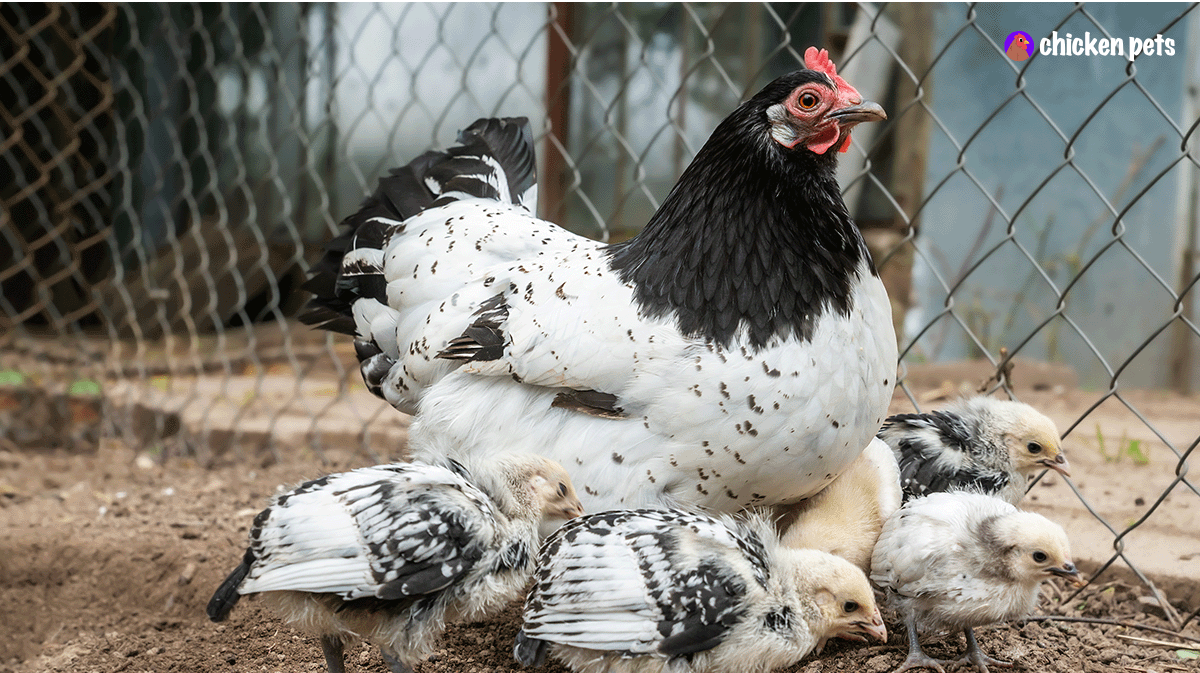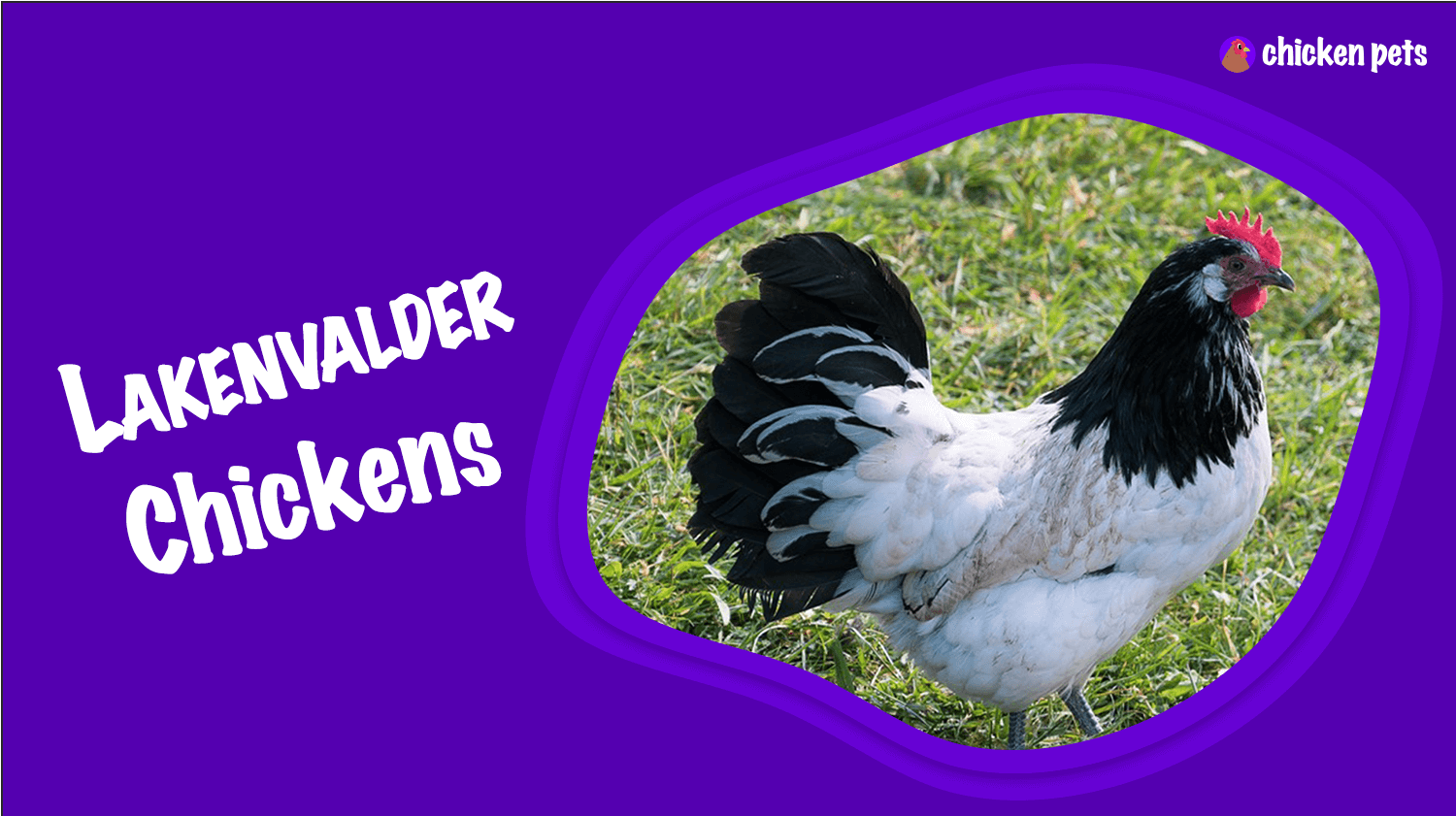Are you thinking about adding chickens to your backyard menagerie? If so, you may be considering a Lakenvelder chicken. These beautiful birds have a striking black-and-white pattern, and they’re known for their friendly personalities and good egg-laying abilities. This article will cover all the basics of Lakenvelder chickens, including their characteristics, egg-laying skills, and care requirements. We’ll also discuss the pros and cons of keeping Lakenvelder chickens as pets, so you can decide if this breed suits you.
What is a Lakenvelder chicken?
Lakenvelder chickens are small to medium-sized chicken breeds originally from the Netherlands. They are named after the town of Lakenveld in North Brabant, where they were first developed. Lakenvelder chickens are known for their distinctive black and white feathering, with a white body, black neck, wings, and tail. They have bright red combs and wattles and are generally friendly and easy to handle.
Characteristics and appearance of Lakenvelder chickens.
Lakenvelder chickens are small to medium, with hens weighing around 4-5 pounds and roosters weighing about 6-7 pounds. They have a single comb and red wattles, and their feathers are white with black markings on the neck, wings, and tail. Lakenvelder chickens are known for their striking black-and-white pattern, which sets them apart from other chicken breeds.
| Chicken Fact | Description |
|---|---|
| Breed Name | Lakenvelder |
| Size and Weight | Medium-sized, weighing 4-6 pounds (1.8-2.7 kg) for hens and 5-7 pounds (2.3-3.2 kg) for roosters |
| Egg Laying Rate | Good egg layers, averaging 3-4 eggs per week |
| Egg Color and Size | Small to medium-sized eggs, typically white or cream-colored |
| Temperament and Personality | Friendly and docile, with a calm and curious personality |
| Hardiness | Resistant to cold weather and adaptable to various climates, but may be prone to frostbite on their combs and wattles |
| Resistance to Common Chicken Diseases and Parasites | Generally healthy and hardy, with no known breed-specific diseases or parasites |
| Popular Uses | Mainly kept for their attractive plumage and good egg-laying abilities but also used for meat and exhibition purposes |
| Specific Care Requirements | Require a secure coop and run to prevent predation, as well as regular cleaning and maintenance of their feathered legs and feet to prevent mud and dirt build-up |
| Life Expectancy | Average lifespan of 5-7 years |
| Origin and History of the Breed | The Lakenvelder breed originated in the Netherlands and has been around since at least the 1800s. They were first brought to the United States in the late 1800s and were admitted to the American Poultry Association’s Standard of Perfection in 1939. |
A poultry PSA: Your chicken may vary
Please note that chickens are like snowflakes, no two are the same. The facts presented are a general idea of what to expect. Your chicken may vary in size, weight, egg-laying rate, and general attitude. Treat them like individuals and you'll be just fine!
The egg-laying ability of Lakenvelder chickens.
Lakenvelder chickens are good egg-layers, producing around 150-200 eggs annually. Their eggs are small to medium and white or tinted in color. Lakenvelder hens are generally reliable layers and tend to lay well even in cold weather.
Temperament and personality of Lakenvelder chickens.

Lakenvelder chickens are known for their friendly and outgoing personalities. They are generally easy to handle and make good pets, especially for children. They are active and curious birds and enjoy foraging for food in their surroundings. Lakenvelder chickens are generally good-natured and friendly, making them popular among backyard chicken keepers.
How to care for Lakenvelder chickens in your backyard.
Caring for Lakenvelder chickens is similar to caring for other chicken breeds. They need a secure coop or chicken run to protect them from predators, and they should have access to fresh water and a balanced diet of chicken feed and treats. Lakenvelder chickens are hardy birds and can tolerate cold weather, but they should have access to shelter to protect them from extreme temperatures and weather conditions.
Pros and cons of having Lakenvelder chickens as pets.
There are many benefits to keeping Lakenvelder chickens as pets. They are beautiful birds with striking appearances and are known for their friendly personalities and good egg-laying abilities. Lakenvelder chickens are also easy to care for and thrive in many climates.
However, there are some drawbacks to keeping Lakenvelder chickens as pets. These birds can be pretty vocal and may be too loud for those who live near neighbors. They require more space than other breeds of chickens, so you must provide a larger coop or pen. Additionally, they can be prone to feather picking, generally caused by stress and boredom. If not monitored closely, this behavior can lead to health problems that could impact their lifespan and overall well-being.
Chicken breeds that are similar to Lakenvelder chickens.
Several chicken breeds share some similarities with Lakenvelder chickens. These breeds include:
- Ancona — This breed has a black and white feather pattern similar to the Lakenvelder and a single comb.
- Leghorn — Leghorn chickens are known for their excellent egg-laying abilities, similar to Lakenvelder chickens. They are also similar in size and weight and have a single comb.
- Hamburg — Hamburg chickens have a similar upright single comb and active foraging habits as Lakenvelder chickens. They also come in several different color varieties, including black and white.
- Campine — This breed has a black and white feather pattern similar to the Lakenvelder and a single comb. They are known for their excellent egg-laying abilities and are identical in size and weight.
While these breeds share some similarities with Lakenvelder chickens, they each have unique characteristics and traits that distinguish them.
Frequently asked questions about Lakenvelder chicken breed.
Now we’ll answer all your burning questions about the beautiful and rare Lakenvelder chicken breed below. Let’s get clucking!
Are Lakenvelder chickens rare?
Lakenvelder chickens are considered a rare breed in some countries, such as the United States. However, they are more common in their country of origin, the Netherlands. The breed has seen a resurgence in popularity in recent years, and efforts are being made to conserve and promote the breed.
Are Lakenvelder chickens dual-purpose?
Yes, Lakenvelder chickens are considered a dual-purpose breed suitable for egg and meat production. They are known for their excellent egg-laying abilities, as well as their flavorful meat.
How long do Lakenvelder chickens live?
On average, Lakenvelder chickens have a lifespan of 5-7 years. However, with proper care and maintenance, some individuals may live longer.
What color eggs do Lakenvelder chickens lay?
Lakenvelder chickens typically lay small to medium-sized white or cream-colored eggs. However, the color and size of the eggs may vary depending on individual genetics and environmental factors.
How many eggs does Lakenvelder lay?
Lakenvelder chickens are good egg layers, averaging 3-4 eggs per week. However, the number of eggs laid may vary depending on individual genetics, age, and environmental factors.
What is the origin of the name “Lakenvelder”?
The name “Lakenvelder” comes from the Dutch words “laken” (meaning sheet or linen) and “velder” (meaning field). This likely refers to the breed’s striking black-and-white feather pattern, which resembles a sheet of linen fabric.
Are Lakenvelder chickens good for free-ranging?
Yes, Lakenvelder chickens are known to be good free-range birds. They are active and curious and enjoy foraging for insects and other treats in an ample outdoor space. However, it is essential to keep them safe from predators and provide them with a secure coop for shelter at night.
Do Lakenvelder chickens have any special dietary requirements?
Lakenvelder chickens do not have any specific dietary requirements beyond a balanced diet that provides them with the necessary nutrients for good health. They enjoy a variety of foods, including grains, fruits, vegetables, and protein sources such as insects and meat scraps.
Are there any recognized color varieties within the Lakenvelder breed?
No, there is only one recognized color variety within the Lakenvelder breed, which is black and white. However, some birds may display slight variations in their feather pattern or coloration.
How do Lakenvelder chickens do in confinement, such as in a backyard coop?
Lakenvelder chickens can do well in confinement, such as in a backyard coop, as long as they have enough space to move around and access fresh air and sunlight. It is crucial to provide them with a clean and secure living environment and allow them some time outside the coop to stretch their legs and forage.
Are Lakenvelder chickens good with children and other pets?
Lakenvelder chickens are generally friendly and docile and can do well with children and other pets when properly socialized. However, it is essential to supervise interactions between chickens and other animals to ensure everyone’s safety.
What is the temperament of Lakenvelder roosters compared to hens?
Lakenvelder roosters are known to protect their flock and may exhibit aggression towards other roosters or perceived threats. However, they can become more docile and friendly with proper socialization and training. Lakenvelder hens are generally calm and curious and enjoy interacting with their caretakers.
What type of comb do Lakenvelder chickens have?
Lakenvelder chickens have a single comb, which is medium-sized and upright. The comb may be red or black and comprises several distinct points. The comb regulates the chicken’s body temperature and can indicate overall health and vitality. A healthy Lakenvelder chicken should have a clean and well-formed comb, free of discoloration or abnormalities.
How often do Lakenvelder chickens go broody?
Lakenvelder chickens are known to go broody occasionally, especially in the spring and summer months when the weather is warmer. However, they are not as broody as some other breeds and may not go broody in some cases.
Are Lakenvelder chickens good at foraging for their food?
Yes, Lakenvelder chickens are good at foraging for their food. They enjoy scratching and pecking for insects, worms, and other small creatures, as well as foraging for plant matter such as grass, weeds, and seeds.
What are some common health issues that affect Lakenvelder chickens?
Lakenvelder chickens are generally hardy and healthy, with no known breed-specific health issues. However, like all chickens, they may be susceptible to common poultry diseases such as coccidiosis, Marek’s disease, and respiratory infections. Proper care, including a clean living environment and good nutrition, can help prevent these health issues.
Do all poultry associations recognize Lakenvelder chickens?
Lakenvelder chickens are recognized by many poultry associations, including the American Poultry Association (APA) and the British Poultry Standards (BPS). However, the breed may not be recognized by all poultry associations in all countries.
Conclusion: Is a Lakenvelder the right chicken breed for you?
It all depends on your personal preferences. If you want a beautiful, friendly bird that lays lots of eggs and enjoys having more space for them to roam, then the Lakenvelder may be a perfect choice. However, if you’re looking for a pet chicken that is quiet and prone to feather picking, you better suit other breeds. Ultimately it comes down to what works best for your specific situation and needs.
No matter which breed you decide on, chickens make wonderful pets that provide hours of entertainment and can become part of the family. Researching their needs and behaviors is essential in ensuring they have long, healthy lives as beloved companions.

















